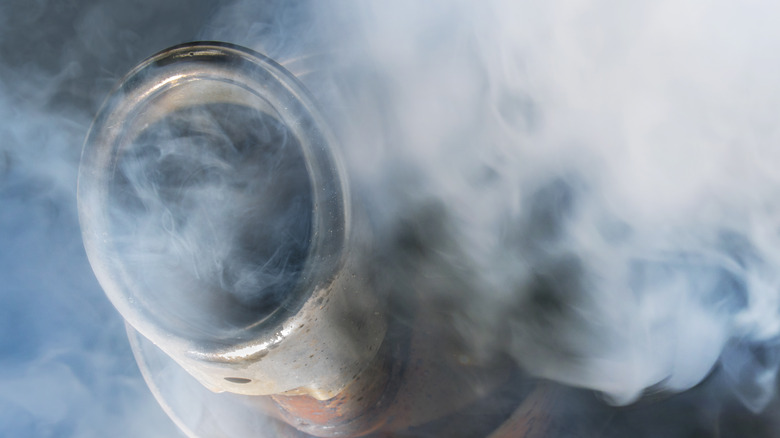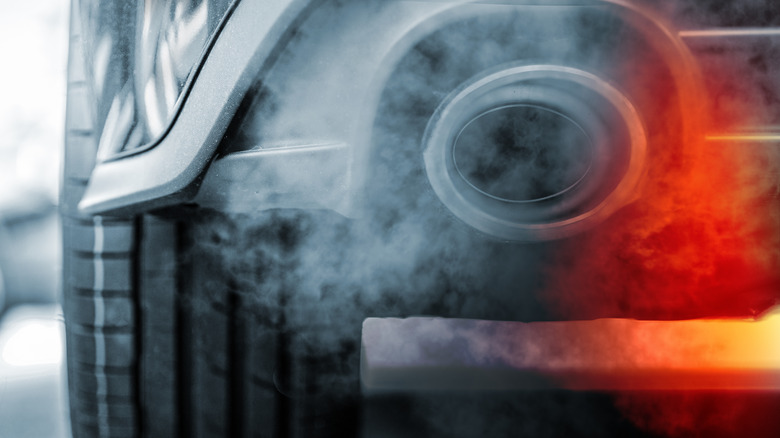Are Diesel Fumes Toxic? Health Effects Of The Fuel's Exhaust, Explained
If you live in the United States and own an internal-combustion vehicle, you almost certainly use gasoline rather than diesel fuel. But that doesn't mean diesel isn't widely used. On the contrary, the U.S. economy is dependant on diesel.
Though diesel fuel is usually more expensive than gas, it's more efficient, and powers a variety of transport vehicles, including trucks, trains, and ships. In 2022 alone, the U.S. transportation sector consumed approximately 125 million gallons of diesel fuel per day. The U.S. military also relies on diesel for its ground vehicles, such as tanks and trucks, because it is less flammable and explosive than gasoline. Industrial facilities, hospitals, and other large buildings use diesel in backup electricity generators.
On the flip side, diesel engines are typically bigger and heavier than gasoline engines, and the combustion of diesel releases approximately 13% more CO2 than gasoline. Diesel fumes, meanwhile, are highly toxic and pose a serious health risk.
What happens when you're exposed to diesel fumes
Diesel fumes are a mix of gases, vapors, aerosols, and particulate matter. Not all diesel fumes are the same, as their composition depends on the type of engine, fuel, oil, and other factors.
Diesel exhaust may contain ammonia, nitrogen oxides, nitrogen, sulfur oxides, aromatic compounds like benzene and toluene, alcohols, aldehydes, hydrocarbons, and ketones. Diesel particulate matter mainly consists of soot, carbon, ash, polycyclic aromatic hydrocarbons, metallic particles, silicates, and sulfates. Most of these particles are less than 1.0 micron in diameter, so they are small enough to inhale.
Short-term exposure to diesel fumes can result in nausea, headache, increased blood pressure (which you can measure with some Galaxy watches), skin irritation (in case of direct contact with diesel fuel), and poor coordination. It can also impact cognition. Long-term exposure to diesel fumes has been linked to lung cancer. Some studies suggest prolonged exposure to diesel fumes can also cause bladder cancer, and research has found that diesel exhaust can cause DNA changes in humans.
Staying safe around diesel fumes
According to the Occupational Safety and Health Administration, a combination of engineering and administrative controls is the best way to minimize exposure to toxic diesel fumes in the workplace.
The engineering controls the agency recommends include routine maintenance of diesel engines, the installation of exhaust filters, oxidation catalysts, and ventilation systems, as well as the use of fuel additives. As for administrative controls, OSHA recommends speed limits, the prohibition (or restriction) of idling diesel engines, restrictions on the amount of diesel-powered equipment, and the introduction of areas where diesel engines are disallowed.
Those exposed to diesel fumes at work should wear respirators and minimize the time spent near idling engines. Limiting exposure to diesel fumes in your environment can be challenging, but there are still precautions you can take, like staying away from large sources of diesel exhaust, such as trucks and buses.
While there are certainly some diesel myths you need to stop believin, the fumes produced during the combustion of diesel fuel aren't one of them. These fumes are undeniably toxic, and you should take the necessary precautions to stay safe.


